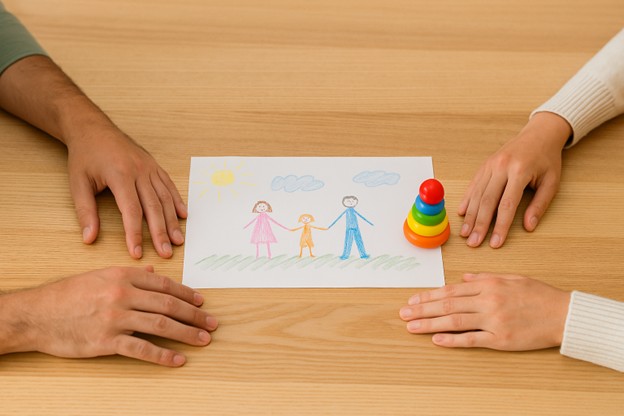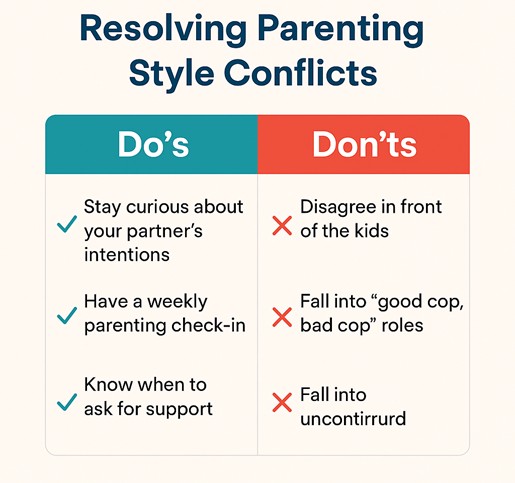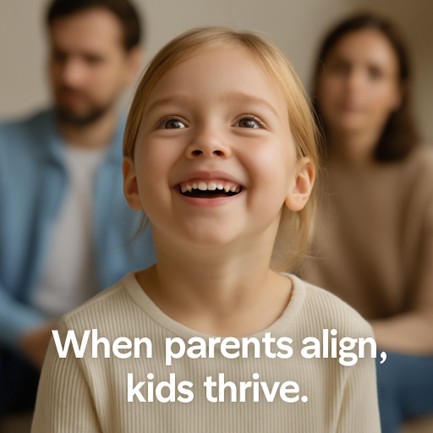Managing Different Parenting Styles: How to Stay Connected While Raising Kids Together
You’re Not Failing—You’re Just Parenting Differently
No two people grow up in exactly the same way. So it makes sense that no two parents will approach parenting the same way either.
Still, when those differences surface—whether it’s over discipline, bedtime routines, screen time, or how to handle a meltdown in the middle of Costco—it can feel personal. Tense. Maybe even like you’re on different teams.
But here’s the truth: having different parenting styles doesn’t mean you’re incompatible. It means you’re human. And like every other part of your relationship, parenting well together takes intention, communication, and yes—some trial and error.
Many couples come to therapy not because they’re bad parents or don’t love their kids—but because they’re stuck in conflicting parenting patterns that leave them feeling unheard, frustrated, or divided.
One partner might be more structured, the other more go-with-the-flow. One may prioritise emotional expression, the other values rules and routine. Neither is wrong—but navigating those differences without damaging your connection? That’s the challenge.
The good news: these differences can actually bring balance—if you learn how to work through them as a team.
In this blog, we’ll break down:
Because when your relationship is grounded, your parenting becomes stronger. And when your parenting is aligned, your whole family benefits.
Why Parenting Styles Clash (Even in Loving Relationships)
It’s easy to assume that parenting disagreements are a sign that something is wrong in the relationship. But in truth, most parenting conflicts aren’t about who’s right or wrong. They’re about differences in life experience.
You and your partner were likely raised in different homes, by people with very different ideas about what it means to parent well. Maybe one of you believes in firm rules and consequences, while the other leans toward flexibility and emotional validation. These styles aren’t just personality quirks. They’re rooted in each person’s childhood experiences, culture, and sense of safety.
When those differences clash, it can feel personal. A disagreement about how to handle a child’s tantrum can suddenly feel like a question of your competence, your values, or your love for your kids.
What began as a practical discussion can quickly become emotional:
That’s where things often break down. The issue isn’t the parenting decision itself. It’s the sense of being misunderstood or unsupported by the person you’re supposed to parent with.
Parenting Conflict Is Common, but It Can Still Be Painful
At Sigpark Counselling, we regularly see couples struggle with parenting stress. This isn’t because they’re bad parents. It’s because raising children activates some of the deepest parts of our identity—how we love, how we protect, and how we define success.
And the pressure isn’t just emotional. Studies published in the Journal of Family Psychology show that parenting disagreements are one of the top predictors of relationship dissatisfaction in couples with children. These same studies also found that unresolved parenting conflict can affect children directly, leading to more emotional distress, behavioural challenges, and trouble managing stress.
So if you’ve been feeling frustrated, disconnected, or caught in the same arguments about how to raise your child, you’re not alone. And it doesn’t mean your relationship is broken. It means you need better tools to navigate the differences.
Different Doesn’t Mean Divided
You and your partner don’t have to parent the same way to be effective. What matters most is that you stay connected and respectful when your approaches differ. That’s where real alignment begins—not in total agreement, but in how you communicate and support one another when things feel hard.
In the next section, we’ll look at the most common areas where parenting styles tend to clash and what signs to look for in your own relationship.

Where Parenting Styles Clash Most (And Why It Matters)
Let’s get one thing straight: parenting disagreements are completely normal. You and your partner are two different people, with different upbringings, personalities, and emotional instincts. Of course you won’t always agree.
But here’s the problem: when different parenting styles conflict, it doesn’t just affect how you raise your kids. It can quietly chip away at the trust and emotional connection between you.
At Sigpark Counselling, we work with many couples facing this exact issue. Not because they don’t love their children—but because the stress of parenting without alignment can make anyone feel overwhelmed, unheard, or frustrated.
Let’s break down the top five conflict zones and what you can start doing about them.
1. Discipline: Tough Love vs. Gentle Parenting
Sound familiar?
This push and pull is one of the most common sources of conflict for co-parents. And it’s more than just a difference in opinion—it’s often rooted in your own childhood experiences.
The American Academy of Pediatrics advises against punitive discipline methods, recommending approaches that combine structure with emotional connection. But when only one partner adopts this approach, it can feel like the other is being “too soft” or “too harsh.”
Pro tip: Instead of arguing over the punishment, agree on the message you want to send as a team. Then decide together how to deliver it.
2. Daily Routines and Rules
Bedtime. Screen time. Mealtime. You know, the stuff that happens every single day.
One of you sticks to schedules. The other is more go-with-the-flow.
That dynamic can work… until it doesn’t. When it starts to create friction, it’s usually not about the bedtime routine itself. It’s about whether you feel backed up by your partner.
Need a reality check on screen time expectations? The Canadian Paediatric Society outlines helpful, age-specific screen time guidelines. These can be a solid reference point when negotiating routines as a team.
3. Extended Family Boundaries
Disagreements about grandparents, siblings, or in-laws might not seem like parenting issues at first—but they often are.
Do you accept advice from Grandma? Do you push back when an uncle undermines your rules? If you’re not on the same page, resentment can grow fast.
Multigenerational families can offer huge emotional and practical support—but only when boundaries are clear. Zero to Three offers guidance on navigating these complex relationships with respect and clarity.
4. Academic Performance vs. Emotional Health
Some parents are grade-driven. Others focus on confidence and mental wellness. Neither is wrong—but the tension between them can confuse your child and cause emotional strain at home.
According to the American Psychological Association, nearly 1 in 3 children report physical symptoms of stress—much of it tied to academic pressure or unclear expectations from caregivers.
Instead of debating homework volume, start with this question:
What does success look like in our family—and are we modelling it?
5. The Uneven Load
This one’s sneaky. Even in relationships with strong foundations, one partner often becomes the “default parent.”
They carry the emotional labour—school forms, lunches, meltdowns, bedtime. The other steps in to help… sometimes.
Over time, this leads to resentment, especially if the workload imbalance isn’t acknowledged. This isn’t just a logistics issue. It’s a relationship one.
The Gottman Institute calls this the “mental load,” and research shows it’s one of the biggest contributors to long-term dissatisfaction in relationships with children.
Couples who commit to co-parenting counselling often start here—redistributing responsibilities, not based on fairness, but based on mutual capacity and understanding.
What It All Comes Down To
Every couple brings a unique set of strengths to the parenting equation. But when parenting disagreement help isn’t sought early, minor differences can turn into long-standing resentments.
If you and your partner are navigating these tensions, you don’t have to “fix it” overnight. You just need the tools to talk it through.
In the next section, we’ll cover 5 do’s and don’ts that can turn frustrating parenting moments into opportunities for growth—as parents and as partners.
5 Do’s and Don’ts for Handling Parenting Disagreements
Even the most connected couples hit roadblocks when raising kids. But how you handle those disagreements matters just as much—if not more—than what you’re disagreeing about.
Research shows that constructive conflict resolution between parents doesn’t just benefit the couple—it supports better emotional outcomes for the kids, too. According to Harvard University’s Center on the Developing Child, children thrive when they observe respectful problem-solving between caregivers.
So let’s look at five practical do’s and don’ts that help reduce friction, rebuild trust, and keep you functioning as a team.
DO: Stay Curious About Your Partner’s Intentions
Instead of assuming they’re being rigid or “too soft,” ask:
Chances are, you’re both trying to support your child—but from different emotional instincts. Staying curious opens the door to collaboration, not competition.
“The moment you stop assuming the worst is often the moment connection returns.”
If you’re struggling to bridge the gap, a few sessions of co-parenting counselling can help shift the conversation from who’s right to what’s working.
DON’T: Disagree in Front of the Kids
This one’s tricky—especially when you’re in the heat of the moment. But when parents argue in front of their children, even over small things, it creates uncertainty. Children are incredibly perceptive, and they pick up on tone, stress, and emotional withdrawal.
A report from the Parents Newsletter highlights that unresolved parental conflict is one of the top contributors to childhood anxiety and behavioural issues.
Keep the discussion private. If a disagreement starts to bubble up during a family moment, agree to revisit it later—preferably when the kids are out of earshot.
DO: Have a Weekly Parenting Check-In
You schedule work meetings. Why not schedule one for the most important job you share—raising your child?
Set aside 20–30 minutes once a week to:
If you need a structure to guide the conversation, try using the “What went well? What could we change?” format. This small habit alone can reduce parenting disagreements by half.
(We talk more about routines like this in our relationship therapy blog—because successful couples don’t avoid conflict, they learn how to manage it.)
DON’T: Fall into “Good Cop, Bad Cop” Roles
When one parent always disciplines and the other always comforts, it doesn’t just confuse the child—it creates long-term imbalance in the relationship.
This is a common pain point for couples seeking parenting disagreement help in our Vancouver counselling practice. Over time, one partner starts to feel isolated or resented—either as the “enforcer” or the “pushover.”
Solution: Discuss boundaries and consequences ahead of time so you’re not improvising in the moment. When your child sees that you back each other up, they feel more secure—and you feel more respected.
DO: Know When It’s Time to Get Support
You don’t need to be in crisis to benefit from therapy. In fact, couples who seek family counselling in Vancouver before conflict becomes chronic tend to experience the most lasting breakthroughs.
Studies show that couples who commit to just 8–12 sessions of parenting or relationship counselling experience measurable improvements in communication, trust, and emotional connection. (Source, Journal of Marital and Family Therapy)
At Sigpark Counselling, our approach is centred on helping parents feel more like a team—even when their parenting styles differ. It’s not about changing who you are. It’s about helping you understand each other better.
Final Thought
Parenting disagreements are inevitable—but they don’t have to become divisive.
If you’re ready to stop fighting the same battles and start feeling more supported, co-parenting counselling can help. The most important thing to remember is that when parents work together, everyone wins—especially the kids.

Aligning Without Always Agreeing
Let’s face it — no two parents will agree on everything. And that’s okay. Alignment doesn’t mean being identical. It means creating a shared understanding and approach, even when your instincts differ.
The goal of co-parenting isn’t perfection. It’s consistency.
Disagreements about screen time, discipline, bedtime, or chores are common. But when they’re unresolved or handled in front of children, they can lead to confusion and anxiety for the child. A 2023 article from the Child Mind Institute highlights that even well-meaning disagreements can result in kids “splitting” their parents — going to one for yes and avoiding the other.
That’s why parental unity matters more than parental similarity.
Here’s how to get aligned without giving up your values:
If you feel like you’re stuck in the same unresolved loops, counselling can offer a neutral space to help navigate those tough spots. Sigpark Counselling’s family counselling in Vancouver is designed to support couples and families through these very challenges.
When Parenting Disagreements Turn Into Patterns
Occasional disagreements are part of parenting. But if you’re noticing recurring tension, power struggles, or silence after every conversation, it might not just be about bedtime routines or curfew anymore.
This is when conflict becomes a pattern, not just a moment.
Signs that your parenting disagreements may be turning into a deeper issue:
When these patterns take hold, they can affect your relationship and your child’s sense of security. According to research published in the Journal of Family Psychology, unresolved parental conflict—even when it’s subtle—can negatively affect a child’s emotional regulation and behaviour (source: APA PsycNet).
This is where co-parenting counselling becomes a game-changer. It’s not about deciding who’s right. It’s about developing new patterns that support the emotional well-being of both partners — and the children they’re raising together.

How Counselling Can Help You Parent as a Team
You don’t need to solve parenting conflict alone. In fact, couples often wait too long to ask for help — by the time they do, frustration has hardened into resentment.
Counselling isn’t about fixing a broken relationship. It’s about strengthening the partnership underneath it.
At Sigpark Counselling, we offer a safe, structured space to:
- Explore your parenting values and how they were shaped.
- Unpack communication habits that may be working against your goals.
- Learn conflict resolution techniques tailored to your family’s needs.
- Build a parenting framework that balances both of your strengths.
And it works.
Studies show that couples who attend at least 8 to 12 sessions of family counselling in Vancouver are significantly more likely to maintain improvements in communication, shared decision-making, and emotional closeness.
As Sangeeta Sirohi, RCC and founder of Sigpark Counselling, puts it:
“You don’t have to wait for things to fall apart before getting support. The couples who benefit most from therapy are often the ones who reach out early — when connection still matters and hope is still present.”
Whether you’re parenting toddlers, teens, or somewhere in between, therapy can help you stop the cycle of conflict and start building a united front.
Ready to feel more like a team? Book a consultation with Sigpark Counselling today.
You can parent differently and still stand together. All it takes is a willingness to listen, learn, and lead as partners.







